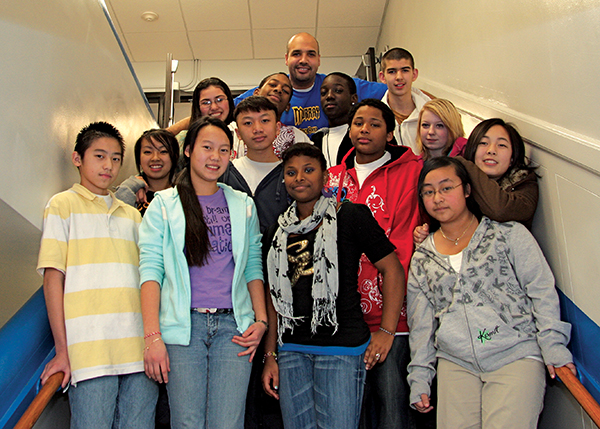Ramp-Up to Readiness is a schoolwide program that aims to help all students graduate from high school ready for postsecondary success. Through weekly lessons and activities during schools’ advisory periods, Ramp-Up to Readiness seeks to improve college and career readiness for all students.
A study by the REL—the U.S. Department of Education’s Institute of Education Sciences Regional Education Library— showed that, even in the first year of Ramp-Up’s use in a school, students perceived increased support for exploring career and postsecondary options and finances. School staff reported that Ramp-Up’s strengths include a well-designed curriculum.
“We have a really powerful program that many more kids in schools across the United States should be using.”
The evidence-based curriculum covers different areas of postsecondary success—academic, admissions, career, financial, and social-emotional skills. It also encourages teachers, students, and parents to work together on a plan for graduation and beyond.
“We’re trying to bust up the mentality of who ‘should’ and ‘should not’ go to college,” says director Jennifer Kunze.
Trying to keep up with demand
Housed in CEHD’s College Readiness Consortium, Ramp-Up to Readiness implemented its first fully developed programming in 2012, and it’s been growing ever since. Schools in nine states use Ramp-Up’s curriculum to prepare students for life after graduation.
As the program grew, Kunze and College Readiness Consortium director Julie Sweitzer noticed that the Ramp-Up to Readiness website wasn’t keeping up.
School staff members were using the Ramp-Up website to access and purchase curriculum. But the site wasn’t always user friendly, and the payment system was inefficient. Plus, they believed a better website could help Ramp- Up market the program and further its reach.
“We have a really powerful program that many more kids in schools across the United States should be using,” Kunze says. “But we haven’t been able to get our name out there with the small team that we have.”
That’s where Educational Technology Innovations (ETI), a start-up team based in CEHD, got involved.
Retooling for customer service and national reach
ETI had the expertise to fill gaps in user experience, design, and marketing—areas that Ramp-Up couldn’t cover on its own.
“When we walked in, we didn’t know that they could offer as much as they did,” says Kunze. “And it’s excellent for us because we’re a super small team.”
Ramp-Up’s online curriculum is updated frequently to reflect changing admissions standards and career statistics. The new, more efficient website with an updated payment system makes it much simpler for schools to stay up to date with lessons.
“I’ve been frustrated that it’s harder for schools to grab our curriculum,” Kunze says about the old website. “Now schools can get our information really quickly and easily.”
For Kunze and Sweitzer, it was important to pair website improvements with a strong marketing strategy. Previously, Ramp-Up had expanded mostly through word of mouth or educators with CEHD connections.

“We felt we had reached a good proportion of Minnesota school leaders and counselors, but ETI provided the opportunity to engage a national audience,” says Sweitzer.
Ramp-Up to Readiness was already doing a lot of things right, says ETI director Ryan Warren. His goal was to build on its current strengths and enable Ramp-Up for future growth.
The new website will also be mobile friendly and will feature Ramp-Up’s five areas of focus more prominently than in the past. Improvements in search engine optimization and social media outreach will help more educators discover the program.
“We haven’t abandoned the core of what makes Ramp-Up successful,” Warren says. “But we needed to modernize what they had done to reach more audiences.”
One of ETI’s core strengths is its experience crafting technology that enhances educational experience and benefits communities. For Sweitzer, that care and expertise was essential.
“We appreciated working with a unit that works hard to understand schools and their needs,” she says.
Sustaining an agent for access
Ultimately, Kunze hopes the collaboration with ETI will lead to better outcomes for schools and students who use Ramp-Up to Readiness. When the material is more accessible and easy to use, teachers can lead lessons more efficiently and meaningfully.
And as Ramp-Up expands its reach, any extra income generated will go right back to sustaining and improving programming from year to year.
“This has the potential to bring a whole new population of students into colleges, especially kids who historically have not been on college campuses,” Kunze says. “This could change the trajectory for a lot of families.”
Learn more about Ramp-Up to Readiness and ETI.
